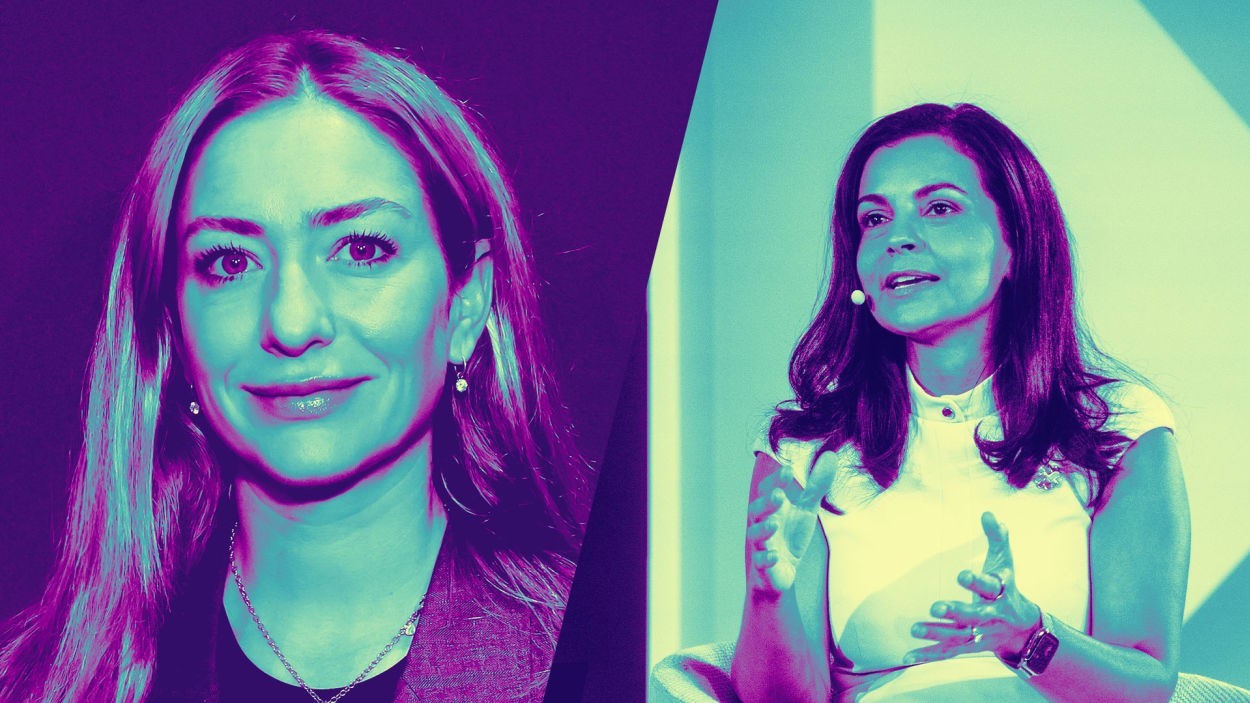Bumble CEO Whitney Wolfe Herd is stepping down from her role at the dating app she founded nearly a decade ago, the company announced on Monday.
Lidiane Jones, who is currently CEO of the workplace-messaging platform Slack, will succeed Wolfe Herd starting January 2. Wolfe Herd, meanwhile, will transition to executive chair.
“The last decade has been completely transformational for me as a human,” Wolfe Herd, who also cofounded Tinder, said in an interview with Fast Company alongside her successor. The founder has shepherded Bumble through growing pains, expansion into new areas like friendship matchmaking and professional networking, the COVID-19 pandemic, an initial public offering in 2021, and fierce competition from Match Group.
But the dating app industry, following a strong pandemic surge, thanks to singles looking for online connection, has been met with challenges as consumers burn out. Shares of Bumble are trading under $13 apiece as of Monday morning; it’s a stark contrast from when the stock was trading at more than $70 per share in its debut. Match Group also warned last week that it anticipates lower-than-expected revenue for the fourth quarter of 2023. Bumble is set to report earnings on Tuesday.
“What makes this partnership so special is we’re not duplicative of one another,” Wolfe Herd said. As executive chair, Wolfe Herd expects to stay focused on the 10-year strategy for the brand, including, she said, areas like public policy and social impact. Jones, for her part, said, “I’m a product leader to the bone,” one with crucial experience in artificial intelligence and managing global teams.
Wolfe Herd has long championed the idea of Bumble, which she founded in 2014 on the principle of empowering women to make the first move, as a cornerstone of “the female internet.” In the app, women have to initiate the first conversation for heterosexual matches. Bumble has since expanded into a larger portfolio of apps, running Bumble for Friends, Fruitz, Badoo, and Official, a relationship-building platform.
Jones’s role is to bring Bumble into its next chapter, especially as AI takes center stage. Wolfe Herd commended Jones, who is a longtime tech veteran—she logged 13 years at Microsoft, led Sonos’ software product team, and spent several years at Salesforce before taking the helm at Slack last year—for her ability to execute on new products and her passion for artificial intelligence. “She understands AI is going to take us to the next level,” Wolfe Herd said.
Jones said that she intends to look for ways to use AI “to continue to augment the perfect match, but also [create] experiences that are more natural for members to discover their match.” She noted that AI can support Bumble’s longstanding emphasis on user safety. “We can really be the leader in defining how AI can bring matches . . . in a safe way.”
Wolfe Herd, as well, sees an opportunity to use AI to “drive more relevant connections, make them safer, [and] make the match-to-meet opportunity shorter.” She said Jones “is uniquely positioned to make sure that this lands in a meaningful and successful way.”
At Slack, Jones has also been focused on how to bring AI into products in a seamless, effective way. In an interview at the Fast Company Innovation Festival in September, she outlined the principles guiding Slack’s approach to AI. She said that all new AI capabilities in Slack had to be “anchored in trust,” with user data protected by a walled garden, and they had to “solve a meaningful problem.”
The Brazilian-born Jones, who attended the University of Michigan on scholarship, also brings an international perspective to Bumble. “Not only am I from a different country and speak different languages, but I have led businesses globally,” she said. “I think there’s a tremendous opportunity to expand our membership globally.”
Shares of Bumble dipped on the news of Wolfe Herd’s transition, trading down more than 6.5%. Reuters reported that some investor sentiment was negative on the announcement. “We view Whitney’s departure as a near-to-midterm headwind for business operations and a negative for overall company morale,” Evercore analysts said in a note, according to the outlet. The Wall Street Journal first reported the news. It follows Bumble’s president Tariq Shaukat stepping down from his post earlier this year.
Ann Mather, chair of the board of directors, said in statement that the company and Wolfe Herd have been thinking about a “thoughtful and deliberate succession plan for quite some time.” Under her new role, Wolfe Herd will still be involved with company operations. “This is really going to be a beautiful partnership,” Wolfe Herd said.
“What drew me [to Bumble] was getting to know Whitney, and the mission that the company has had from day one, really focused on ‘kind connections,’” Jones said. “And Whitney stepping up as the chair of the board is an incredible opportunity for us to bring our collective strength to take Bumble to the next level.”
(5)










